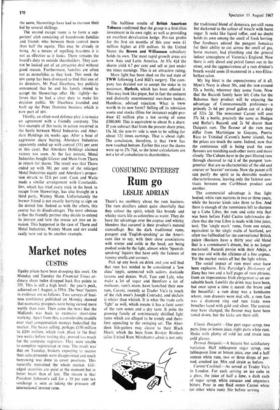Market notes
CUSTOS
Equity prices have been drooping this week. On Monday and Tuesday the Financial Tittles or- dinary share index dropped back five points to 353. This is still a high level: the year's peak, achieved on 1 August, is 359.6. The 'bear' factors in evidence are as follows. Two surveys of busi- ness confidence published on Monday showed that economic prospects were being viewed more warily than ever. Then came the news that the Midlands was back to extensive short-time working. Apart from this, a considerable muddle over steel compensation moneys bedevilled the market. The heavy selling, perhaps £150 million to £200 million, which took place in the final two weeks before vesting day, proved too much for the company registrars. They were unable to complete registration in time. The result was ' that on Tuesday, brokers expecting to receive their sales proceeds were disappointed and much borrowing was done to cover position& This naturally restrained the whole market. Gilt- edged securities are quiet at the moment' but in better heart than of late. The reason is that President Johnson's call for a 10 per cent tax surcharge is seen as taking the pressure off international interest rates.
The halftime results of British American Tobacco confirmed that the group is a first-class investment in its own right, as well as providing an excellent devaluation hedge. Pre-tax profits for the first six months of this year were £1 million higher at £50 million. In the United States the Brown and Williamson subsidiary holds its own. The most rapid growth areas are now Asia and Latin America. At 85s 41c1 the shares yield 4.7 per cent and sell at just under ten times earnings. This is an attractive rating.
More light has been shed on the sad state of TWW following Lord Hill's surgery. The com- pany has decided not to accept the stake in its successor, Harlech, which has been offered it. This may look like pique, but in fact the eminent and distinctly unsentimental merchant banker, Hambros, advised rejection. What is Tww worth in its new form? Selling off its television assets and stocks (films for instance) might pro- duce £2 million plus a tax saving of some £500,000. This is equivalent to about 8s a share. If you subtract that from the present share price, 15s 3d, the non-Tv side is seen to be selling for about 121 times earnings. That is about right. The conclusion, therefore, is that TWW has now touched bottom. Earlier this year the shares were up to 27s 71d, so the latest calculations are not a lot of consolation to shareholders.






























 Previous page
Previous page